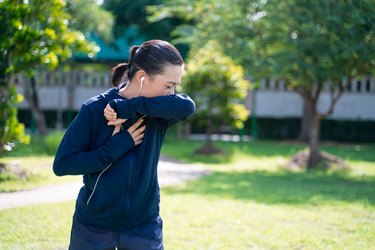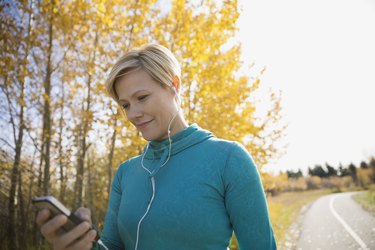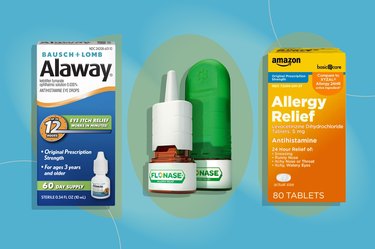

Ever finish up your workout feeling triumphant, but then start sneezing after running? For some people, this is all too common — especially if you were just outside getting your sweat on.
In fact, rhinitis (aka a stuffy nose) affects up to 74 percent of athletes, according to an August 2017 review in the International Journal of Otolaryngology, and it seems to be worse in those who do water sports like swimming or cold-air activities like skiing.
Video of the Day
Video of the Day
Here are four reasons why you sneeze after exercise, plus how to stop a sneezing fit or running nose after your workout.
Tip
If you regularly deal with sneezing after exercise, visit your doctor to determine the root cause of your sniffles.
1. You Have Exercise-Induced Rhinitis
If you have a runny nose after a run or feel congested and are sneezing, exercise-induced rhinitis may be to blame. Yep, for some people, working up a sweat can also trigger a temporary case of the sniffles.
This doesn't mean you're allergic to exercise, though. Basically, your nasal passages become inflamed, which leads to a runny nose, sneezing, congestion and itching. This can happen after indoor or outdoor workouts.
The exact reason this happens is still being studied, according to a November 2018 paper in Annals of Allergy, Asthma & Immunology. And there are no tests to diagnose nonallergic rhinitis. Instead, your doctor will ask you questions about your symptoms and rule out other conditions, like seasonal allergies (more on that in a minute) or sinus problems, according to the Mayo Clinic.
Treatment for exercise-induced sneezing can include saline, corticosteroid or antihistamine nasal sprays, or over-the-counter decongestants if it really bothers you. These can have side effects, though, so talk to your doctor about what might be best for you.
2. You've Got Allergies
Not only can exercising outdoors expose you to a greater amount of allergens, but all that heavy breathing makes things worse.
"When we exercise, the volume of air that moves through our respiratory tract increases. If you are pollen-allergic and choose to exercise outside, you are theoretically exposing your nasal mucosa to more allergen, given that you are moving more pollinated air through the respiratory tract," says board-certified allergist Amina Abdeldaim, MD, MPH.
And this may be the reason why you sneeze after running or other activity.
"In this [outdoor exercise] scenario, there is a higher dose of allergen meeting its antibodies on the surface of the mast cells," Dr. Abdeldaim says. When that happens, mast cells trigger a histamine response, which can lead to a nose that won't stop running, severe sneezing and sinus pressure.
Indoor allergens, too, can trigger symptoms like sneezing. According to the Mayo Clinic, here are just a few sneeze triggers you might encounter during various kinds of workouts, whether you're sneezing after running indoors or finishing up a walk through the park.
- Pollen from trees, ragweed or grass. Each pollen type has its own season to "shine," so different people are affected at different times.
- Spores from mold and certain fungi. These are especially likely to affect you during an indoor workout if your home or fitness center has some lurking.
- For people with allergic rhinitis, doing sit-ups on a carpet full of dust mites can definitely cause sneezing fits.
- If you have pets, animal dander may get up close and personal with your nasal passages while you're dancing up a storm with your aerobics video.
3. It's the Sun's Fault
If you don't have allergies, something else in your environment could be the reason why you can't stop sneezing. For instance, some people may notice their sneezing is triggered by hot or cold temperatures or exposure to bright light (like the sun), Dr. Abdeldaim says.
Specifically, the bright light reflex is called "photic sneeze reflex" (PSR), which is also called autosomal dominant compulsive helio-ophthalmic outburst (ACHOO) syndrome, per a March 2019 paper in Scientific Reports. It's a genetic, normal and relatively common nasal reflex, and it's nothing to worry about. (Just, uh, maybe don't stare at the sun?)
4. You're Sick
Sometimes the reason you're sneezing after exercise is because you're sick. Indeed, colds and flus can cause symptoms like runny nose, congestion, sneezing and sore throat, according to the Mayo Clinic, all of which can act up during a workout.
But should you be running or doing other activity with a sinus infection, cold or other illness? According to the Mayo Clinic, it's OK to exercise while sick if your symptoms are "above the neck" (like runny nose, nasal congestion and sneezing). If your symptoms are "below the neck" (like chest congestion, a hacking cough or nausea), hold off on working out until you recover.
Why Does Your Nose Hurt When You Sneeze?
If your nose hurts when you sneeze, that might be a sign of a sinus infection, which can cause facial pain or pressure, according to the Centers for Disease Control and Prevention.
How to Stop Sneezing After a Workout
If seasonal (or indoor) allergies are the reason why you're sneezing after exercise, here are four things to keep in mind to breathe easier before and after your workout:
1. Look at the Pollen Count
There are many weather apps, like WeatherBug, that will tell you the pollen count in your area, alert you when the pollen is especially high and provide info on the types of pollen that are swirling in the air. (Pollen.com is another resource.)
If pollen is especially high on a given day and you know it bothers you, consider moving your workout inside. Also, pollen counts may be highest in the morning in some areas, according to the American College of Allergy, Asthma & Immunology, so you may want to move your workout later in the day.
2. Step Outside
Pollen counts or ratings might be useful, but you can take stock of the sneeze-ability of a day by just stepping outside. Is it humid? Especially windy?
"Humid air will keep pollen more buoyant, and wind carries pollen and keeps it circulating," Dr. Abdeldaim says. She suggests moving your activity indoors, closing windows and turning on air conditioning to avoid sneezing after a workout.
3. Watch Where You Work Out
If you know you're allergic to indoor allergens like mold or dust mites, then you may notice the sneezing starts following a workout inside, especially in the basement. Basements are known for harboring mold, and carpets, heavy drapes and stacks of books can hold dust, Dr. Abdeldaim says.
Exercising in an area that exposes you to your particular allergens can trigger symptoms. If you're working out at home, play around with the room that you do it in, if possible — you may find that it makes a difference.
4. Keep an Allergen Diary
Knowing what you're allergic to can help you focus on the avoidance measures that help you stay sniffle-free.
"It helps to keep an allergen diary. This is like a food diary that can be reviewed to look for any trigger patterns," Dr. Abdeldaim says. Write down when your allergies flared and what you were doing at the time/where you were. You may start to notice patterns and then can adjust your behavior.
5. See a Specialist
Lastly, allergy testing with a board-certified allergist can help you definitively pinpoint what sets off your sneezing after running or other exercise. Your doctor can then help you come up with a treatment plan that will work for you and your active lifestyle.
- Harvard Health Publishing: "Allergic Rhinitis"
- Mayo Clinic: "Hay Fever"
- Mayo Clinic: "Nonallergic Rhinitis"
- Scientific Reports: "Study on Photic Sneeze Reflex"
- Annals of Allergy, Asthma & Immunology: "Exercise Induced Rhinitis - A Relevant Disease"
- Annals of Allergy, Asthma & Immunology: "Exercise-induced rhinitis: A Common Disorder That Adversely affects Allergic and Nonallergic Athletes"
- International Journal of Otolaryngology: "Prevalence of Rhinitis in Athletes: Systematic Review"
- Mayo Clinic: "Is it OK to exercise if I have a cold?"
- Centers for Disease Control and Prevention: "Sinus Infection"
Is this an emergency? If you are experiencing serious medical symptoms, please see the National Library of Medicine’s list of signs you need emergency medical attention or call 911.


